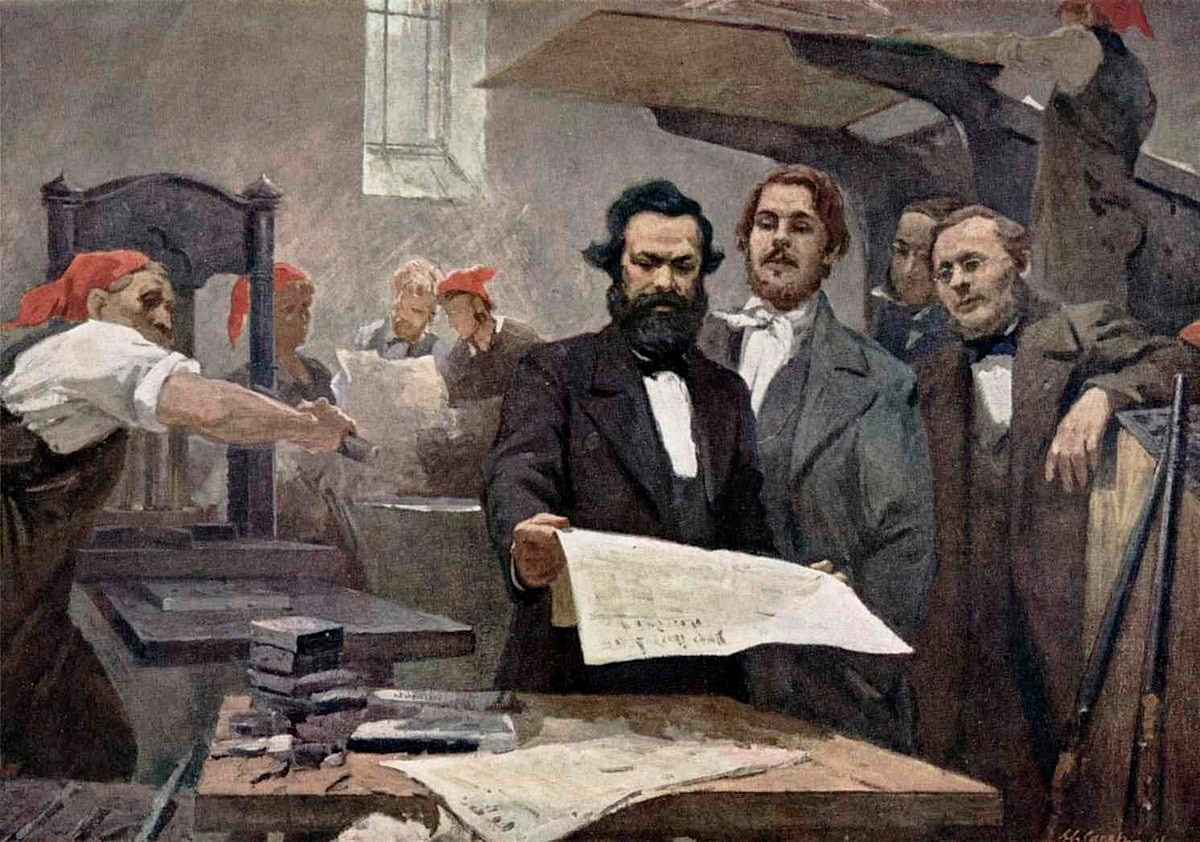AliceMargatroid(讨论 | 贡献) (创建页面,内容为“thumb|Painting illustrating [[Karl Marx and Friedrich Engels, the founders of scientific socialism]]'''马克思主义'''是由卡尔·马克思和Friedrich Engels创立的科学世界观与思想流派。马克思主义发展起来的理论基础是法国空想社会主义、英国政治经济学和德国古典哲学的批判性结合。 自19世纪以来,马克思主义发…”) |
AliceMargatroid(讨论 | 贡献) 无编辑摘要 |
||
| 第1行: | 第1行: | ||
[[File:Marx and Engels 1848.png|thumb| | [[File:Marx and Engels 1848.png|thumb|关于科学社会主义创始人[[马克思]]和[[恩格斯]]的绘画]]'''马克思主义'''是由[[卡尔·马克思]]和[[弗里德里希·恩格斯|Friedrich Engels]]创立的科学世界观与思想流派。马克思主义发展起来的理论基础是法国[[空想社会主义]]、英国[[政治经济学]]和德国古典[[哲学]]的批判性结合。 自19世纪以来,马克思主义发展成几种不同的流派,如[[马克思列宁主义]]、[[毛泽东思想]]、胡志明思想等许多流派。马克思主义科学世界观是通过基于历史[[唯物主义]]的社会和历史发展研究形成的。马克思主义科学世界观是通过基于历史唯物主义方法对社会和历史发展的研究形成的。 | ||
马克思和恩格斯首先在与[[空想社会主义]]者斗争时发展了科学社会主义,《[[资本论]]》第一卷的发行使其发展更进一步。[[列宁]]在二十世纪实现了无产阶级专政。 | 马克思和恩格斯首先在与[[空想社会主义]]者斗争时发展了科学社会主义,《[[资本论]]》第一卷的发行使其发展更进一步。[[列宁]]在二十世纪实现了无产阶级专政。 | ||
== | ==历史== | ||
马克思、恩格斯批判地重新思考和创造性地改造了人类以往科学思想和社会发展的成果,总结了工人群众阶级斗争和革命运动的经验。 | |||
马克思主义是一个完整的理论体系,是在各国工人运动和革命斗争的实践中,在与各种错误思想路线的斗争中,在时代发展提出的新问题、新考验进行创造性研究的过程中发展起来的。 | |||
马克思和恩格斯辞世后,继任者们继续推动马克思主义向前发展。列宁把马克思主义同俄国革命的具体实践结合起来,创造性地发展了马克思主义,提出了帝国主义理论。他发展了马恩关于无产阶级革命和无产阶级专政的理论,提出了建立新型无产阶级政党的理论。他总结了苏维埃俄的实际经验,提出了社会主义建设的基本原则和指导理论。列宁对马克思主义的发展,将马克思主义带到了一个新的阶段,即[[列宁主义]]。 | |||
=== | ===俄国革命与苏联的建立=== | ||
随着1917年[[十月革命]]的爆发,[[布尔什维克]]从[[俄国临时政府]]手中夺取了政权。布尔什维克建立了第一个以[[苏维埃民主]]和列宁主义思想为基础的社会主义国家。布尔什维克承诺退出[[第一次世界大战]],并建立一个无产阶级专政国家。十月革命后,苏维埃政府卷入了[[俄国内战|与白军的战争]]。这一时期的特点是许多社会主义政策的确立和主要以[[马克思列宁主义]]形式出现的新的社会主义思想的发展。 | |||
1919年,新生的苏维埃政府建立了共产主义学院和马克思-恩格斯-列宁研究所,进行马克思主义的理论研究,并为俄国共产党出版官方的思想研究文献。随着列宁于1924年去世,苏联共产主义运动中出现了内部斗争,主要是[[约瑟夫·斯大林]]和[[列夫·托洛茨基]]之间分别以右翼反对派和左翼反对派的形式进行斗争。这些斗争是基于双方对[[马克思列宁主义]]理论的不同解释,这些解释都是基于当时[[苏联]]国情的。 | |||
=== | ===中国革命=== | ||
在[[抗日战争]]更[[第二次世界大战]]结束后,中国无产阶级革命再次爆发。毛泽东领导的中国共产党,把马克思主义基本原理与中国国情相结合,创立了毛泽东思想。中华人民共和国于1949年宣布成立。 | |||
=== | ===20世纪下半叶=== | ||
1959年,[[古巴]]革命爆发,菲德尔·卡斯特罗的[[七二六运动]]胜利。虽然不是明确的社会主义革命,但卡斯特罗在胜利后升任总理,并采用了[[列宁主义]]发展模式,与[[苏联]]结成了联盟。 | |||
===21st century=== | ===21st century=== | ||
At the turn of the 21st century, China, [[Republic of Cuba|Cuba]], [[Lao People's Democratic Republic|Laos]], [[Democratic People's Republic of Korea|North Korea]] and [[Socialist Republic of Vietnam|Vietnam]] remained the only officially Marxist–Leninist states remaining, although a Maoist government led by Prachanda was elected into power in Nepal in 2008 following a long guerrilla struggle. | At the turn of the 21st century, China, [[Republic of Cuba|Cuba]], [[Lao People's Democratic Republic|Laos]], [[Democratic People's Republic of Korea|North Korea]] and [[Socialist Republic of Vietnam|Vietnam]] remained the only officially Marxist–Leninist states remaining, although a Maoist government led by Prachanda was elected into power in Nepal in 2008 following a long guerrilla struggle. | ||
2022年8月13日 (六) 08:47的版本

马克思主义是由卡尔·马克思和Friedrich Engels创立的科学世界观与思想流派。马克思主义发展起来的理论基础是法国空想社会主义、英国政治经济学和德国古典哲学的批判性结合。 自19世纪以来,马克思主义发展成几种不同的流派,如马克思列宁主义、毛泽东思想、胡志明思想等许多流派。马克思主义科学世界观是通过基于历史唯物主义的社会和历史发展研究形成的。马克思主义科学世界观是通过基于历史唯物主义方法对社会和历史发展的研究形成的。
马克思和恩格斯首先在与空想社会主义者斗争时发展了科学社会主义,《资本论》第一卷的发行使其发展更进一步。列宁在二十世纪实现了无产阶级专政。
历史
马克思、恩格斯批判地重新思考和创造性地改造了人类以往科学思想和社会发展的成果,总结了工人群众阶级斗争和革命运动的经验。
马克思主义是一个完整的理论体系,是在各国工人运动和革命斗争的实践中,在与各种错误思想路线的斗争中,在时代发展提出的新问题、新考验进行创造性研究的过程中发展起来的。
马克思和恩格斯辞世后,继任者们继续推动马克思主义向前发展。列宁把马克思主义同俄国革命的具体实践结合起来,创造性地发展了马克思主义,提出了帝国主义理论。他发展了马恩关于无产阶级革命和无产阶级专政的理论,提出了建立新型无产阶级政党的理论。他总结了苏维埃俄的实际经验,提出了社会主义建设的基本原则和指导理论。列宁对马克思主义的发展,将马克思主义带到了一个新的阶段,即列宁主义。
俄国革命与苏联的建立
随着1917年十月革命的爆发,布尔什维克从俄国临时政府手中夺取了政权。布尔什维克建立了第一个以苏维埃民主和列宁主义思想为基础的社会主义国家。布尔什维克承诺退出第一次世界大战,并建立一个无产阶级专政国家。十月革命后,苏维埃政府卷入了与白军的战争。这一时期的特点是许多社会主义政策的确立和主要以马克思列宁主义形式出现的新的社会主义思想的发展。
1919年,新生的苏维埃政府建立了共产主义学院和马克思-恩格斯-列宁研究所,进行马克思主义的理论研究,并为俄国共产党出版官方的思想研究文献。随着列宁于1924年去世,苏联共产主义运动中出现了内部斗争,主要是约瑟夫·斯大林和列夫·托洛茨基之间分别以右翼反对派和左翼反对派的形式进行斗争。这些斗争是基于双方对马克思列宁主义理论的不同解释,这些解释都是基于当时苏联国情的。
中国革命
在抗日战争更第二次世界大战结束后,中国无产阶级革命再次爆发。毛泽东领导的中国共产党,把马克思主义基本原理与中国国情相结合,创立了毛泽东思想。中华人民共和国于1949年宣布成立。
20世纪下半叶
1959年,古巴革命爆发,菲德尔·卡斯特罗的七二六运动胜利。虽然不是明确的社会主义革命,但卡斯特罗在胜利后升任总理,并采用了列宁主义发展模式,与苏联结成了联盟。
21st century
At the turn of the 21st century, China, Cuba, Laos, North Korea and Vietnam remained the only officially Marxist–Leninist states remaining, although a Maoist government led by Prachanda was elected into power in Nepal in 2008 following a long guerrilla struggle.
The early 21st century also saw the election of socialist governments in several Latin American nations, in what has come to be known as the "pink tide". Dominated by the Venezuelan government of Hugo Chávez, this trend also saw the election of Evo Morales in Bolivia, Rafael Correa in Ecuador and Daniel Ortega in Nicaragua. Forging political and economic alliances through international organizations like the Bolivarian Alliance for the Americas, these socialist governments allied themselves with Marxist–Leninist Cuba and although none of them espoused a Leninist path directly, most admitted to being significantly influenced by Marxist theory.
At an event celebrating the 200th anniversary of Marx's birth, Xi said "We must win the advantages, win the initiative, and win the future. We must continuously improve the ability to use Marxism to analyze and solve practical problems", adding that Marxism is a "powerful ideological weapon for us to understand the world, grasp the law, seek the truth, and change the world". Xi has further stressed the importance of examining and continuing the tradition of the CPC and embrace its revolutionary past. struggle and revolutionary movement of the working masses.
The most important theoretical sources of Marxism were classical German philosophy, English political economy and French utopian socialism. Marxism took a fundamentally new approach to solving practical and theoretical problems and gave a scientific answer to the main questions posed by the course of social development and, above all, by the development of capitalism and the labor movement; it overcame the idealism and anti-historical, contemplative nature typical of previous social thought.
Theory
Marx famously states in the Communist Manifesto:
The theory of Communists may be summed up in the single sentence: Abolition of private property.[1]
Marxist theory can be divided into three parts, each part deriving from a different period of his life: Marxist Philosophy, inspired by German Philosophy, Marxist Political Theory, inspired by French Socialism, and Marxian Economics, inspired by English Political Economy.[2]
Philosophy
Marxist philosophy is a materialist philosophy, and it is principally concerned with Dialectical materialism, and Historical materialism. Marx was originally a Hegelian scholar and was often associated with the Young Hegelians, a group of radical Hegelian philosophers in Germany at the time. Like many other Young Hegelians, he distanced himself from them but his philosophy continued to use the same foundation.[2]
Politics
Marxist political thought is his by far Marx's most famous legacy. Marx was initially persuaded by the views of French Socialists such as Robert Owen, Henri Saint-Simon and Charles Fourier.[2] He later rejected their theories, denouncing it as Utopian socialism with no theoretical basis, proposing Scientific Socialism instead.
Economics
Marxist political economy is an application of his philosophy to capitalist economies. His theories were inspired by the British Political Economists Adam Smith and David Ricardo.[2] He showed how capitalism can be analyzed through its own contradictions, beginning in Capital with the commodity.